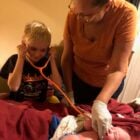Health
Indigenous midwives and doulas provide critical support to maternal health
|
Aspen Mirabal has traveled across Northern New Mexico working with women during pregnancy, birth and postpartum. A member of Taos Pueblo, her work as a doula focuses on ensuring Indigenous women deliver safely in and out of hospitals.
“Sometimes clients don’t know how to advocate for themselves if this is new for them,” said Mirabal about the language spoken among providers in hospitals. Doulas can help with that, she said.
Nicolle Gonzales saw a similar need as Mirabal and decided to pursue midwifery.
“I was very unhappy seeing how the community was being taken care of in hospitals,” Gonzales said. “That really pushed me to go back to school and become a nurse midwife.” Gonzales later formed a nonprofit health organization called Changing Woman Initiative with a focus on reclaiming Indigenous cultural birthing practices.
Today, an effort is growing to make it easier for Indigenous people to access doulas and midwives from their own communities, like Mirabal and Gonzales. Prior to the establishment of the Indian Health Service (IHS), the federal medical system that serves Native populations, most Indigenous births happened outside hospitals with the assistance of women.

